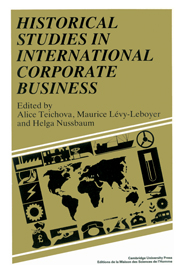Book contents
- Frontmatter
- Contents
- Preface
- 1 Introduction: multinational enterprise
- 2 History, the social sciences and economic ‘theory’, with special reference to multinational enterprise
- 3 The changing form of multinational enterprise expansion in the twentieth century
- 4 Electrical research, standardisation and the beginnings of the corporate economy
- 5 The nature of multinationals, 1870–1939
- 6 International price maintenance: control of commodity trade in the 1920s
- 7 Financial operations of US transnational corporations: development after the Second World War and recent tendencies
- 8 Multinational enterprise – financing, trade, diplomacy: the Swedish case
- 9 Foreign penetration of German enterprises after the First World War: the problem of Überfremdung
- 10 International industrial cartels, the state and politics: Great Britain between the wars
- 11 Vickers and Schneider: a comparison of new British and French multinational strategies 1916–26
- 12 J. & P. Coats Ltd in Poland
- 13 Multinationals and the French electrical industry, 1889–1940
- 14 The Japanese cotton spinners' direct investments into China before the Second World War
- 15 Mitsui Bussan during the 1920s
- 16 Japanese business in the United States before the Second World War: the case of Mitsui and Mitsubishi
- 17 The state and private enterprise in the United States–Latin American oil policy
- 18 Transnational corporations and the denationalization of the Latin American cigarette industry
- 19 Summary: Reflections on the papers and the debate on multinational enterprise: international finance, markets and governments in the twentieth century
- Index of names
- Index of firms
- Index of subjects
1 - Introduction: multinational enterprise
Published online by Cambridge University Press: 04 August 2010
- Frontmatter
- Contents
- Preface
- 1 Introduction: multinational enterprise
- 2 History, the social sciences and economic ‘theory’, with special reference to multinational enterprise
- 3 The changing form of multinational enterprise expansion in the twentieth century
- 4 Electrical research, standardisation and the beginnings of the corporate economy
- 5 The nature of multinationals, 1870–1939
- 6 International price maintenance: control of commodity trade in the 1920s
- 7 Financial operations of US transnational corporations: development after the Second World War and recent tendencies
- 8 Multinational enterprise – financing, trade, diplomacy: the Swedish case
- 9 Foreign penetration of German enterprises after the First World War: the problem of Überfremdung
- 10 International industrial cartels, the state and politics: Great Britain between the wars
- 11 Vickers and Schneider: a comparison of new British and French multinational strategies 1916–26
- 12 J. & P. Coats Ltd in Poland
- 13 Multinationals and the French electrical industry, 1889–1940
- 14 The Japanese cotton spinners' direct investments into China before the Second World War
- 15 Mitsui Bussan during the 1920s
- 16 Japanese business in the United States before the Second World War: the case of Mitsui and Mitsubishi
- 17 The state and private enterprise in the United States–Latin American oil policy
- 18 Transnational corporations and the denationalization of the Latin American cigarette industry
- 19 Summary: Reflections on the papers and the debate on multinational enterprise: international finance, markets and governments in the twentieth century
- Index of names
- Index of firms
- Index of subjects
Summary
So much work has already gone into this theme, and so many accomplished experts have contributed papers on the general and theoretical, as well as on the detailed and empirical question of multinational enterprises, that there hardly appears much scope for a further contribution. And yet the sheer volume and variety of submissions – evidence of the pervasive significance of the topic as well as of the persistence of the organisers of this session – mean that some search for main issues might be useful. Looking through the contributions on multinational enterprises produced for this Congress, it is not difficult to detect a small number of themes which recur, and are worth emphasising.
The initial point is perhaps an obvious one. It concerns the role of historical research. The problem of multinational firms actually existed in the contemporaneous world of economic observation and political anxiety before it became a fully-fledged and explicit topic of historical inquiry. As with other questions in applied economics (inflation, for example, or economic development), it soon became clear that not only did multinationals have a history, they also only exist in history. The historian's task, then, became the essential one of empirical elucidation: to examine the origins of multinational enterprise and investment, to produce a typology of such activities, and to suggest (through case-studies and comparative work) answers to such questions as: Why do multinational enterprises evolve?
- Type
- Chapter
- Information
- Publisher: Cambridge University PressPrint publication year: 1989
- 1
- Cited by



